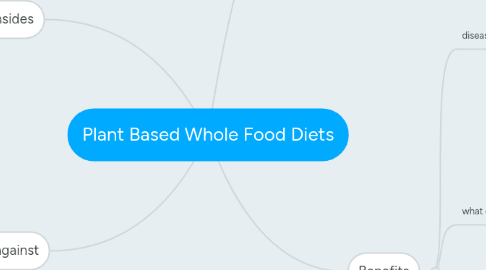
1. Downsides
1.1. long term
1.1.1. does it cause the body to change over time?
1.1.1.1. through generations?
1.1.1.1.1. a kind of adaptation?
1.1.1.2. just in one persons lifetime?
1.1.2. there are a few supplements that have to be taken
1.1.2.1. B12 vitamin
1.2. short term
1.2.1. physical?
1.3. healthy foods can often cost more
1.3.1. short shelf life
1.4. can be a slow adjustment for people new to the diet change
1.4.1. people who have consumed a lot of salt and sugars previously can crave it for a while without it
2. Arguments against
2.1. protein from meat is needed to be healthy
2.2. not enough protein can come from plants
2.3. humans are designed to consume meat
2.4. healthy eating can be expensive
2.5. So scientist have evidence this diet is bad or not beneficial?
2.5.1. Are there other diets that have more benefits?
2.6. milk is needed to develop healthy strong bones
2.6.1. study showing we don't actually need as much calcium as we normally are comsuming
3. Collin T. Campbell
3.1. experiment with mice
3.1.1. Are there further studies going on?
3.1.2. in some cases cancer growth was completely stopped or even reversed
3.2. his book: The China Study
3.2.1. also created a cook book based on his book
3.3. movie he is featured in
3.4. who supports Campbell's ideas?
3.4.1. nutritionist?
3.4.2. scientist?
3.5. advocates whole food diets
3.6. did he work with someone else in his studies?
3.7. how is his research changing the view of diets?
4. Benefits
4.1. disease prevention
4.1.1. heart disease
4.1.1.1. many people are able to reduce the amount of medication taken or even get off the medication completely
4.1.2. diabetes
4.1.3. cancer
4.1.3.1. what types?
4.1.4. how does it prevent these diseases/illnesses?
4.2. what other physical benefits are there?
4.2.1. facts/statistics?
4.2.2. people's personal experience
4.2.2.1. physical experience
4.2.2.2. mental experience
4.2.2.2.1. many people feel they have more energy
4.2.3. healthy way to lose weight
4.2.4. what positive effects does this diet have on the human body?
4.3. environmentally
4.3.1. less livestock
4.3.1.1. fewer carbon gasses released in the air
4.3.1.1.1. helps with global warming
4.3.1.2. more space for crops
4.4. animals
4.4.1. reduction in animals used for food
4.4.1.1. better living environments for animals
4.4.1.1.1. animals live full lives
4.4.1.2. proteins are gain from plants instead
4.4.1.2.1. what are these proteins called scientifically?
4.4.1.2.2. most common example is from soybeans
4.4.1.2.3. can plants proteins be produced at a faster rate?
4.4.1.2.4. in some cases plant proteins can provide more protein than animal proteins
4.4.1.2.5. How are plant proteins comparatively better than proteins from animals?

